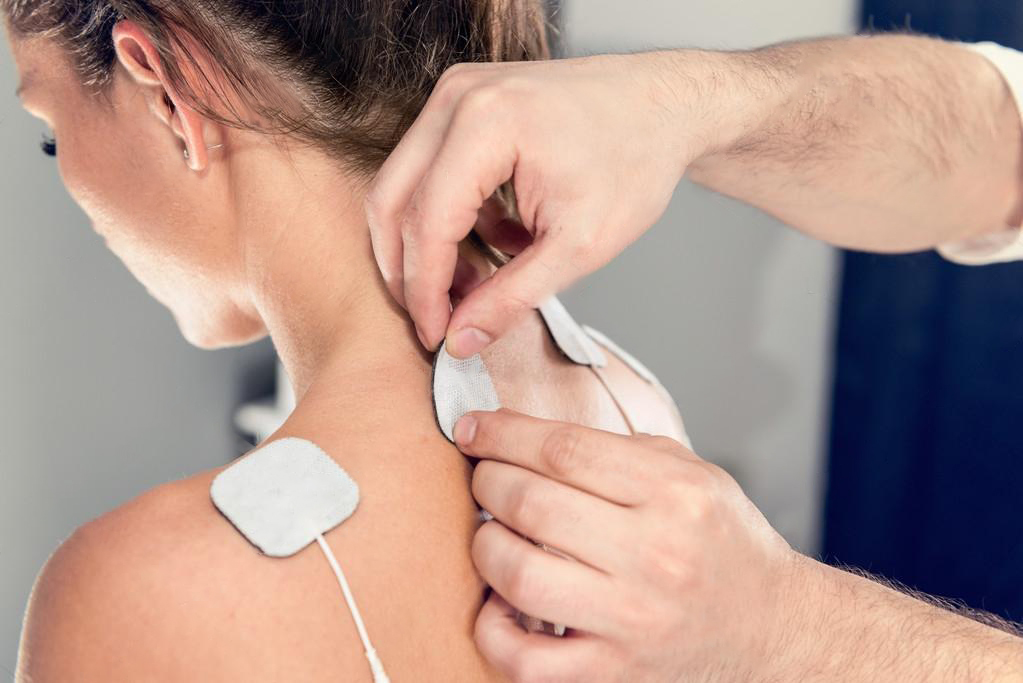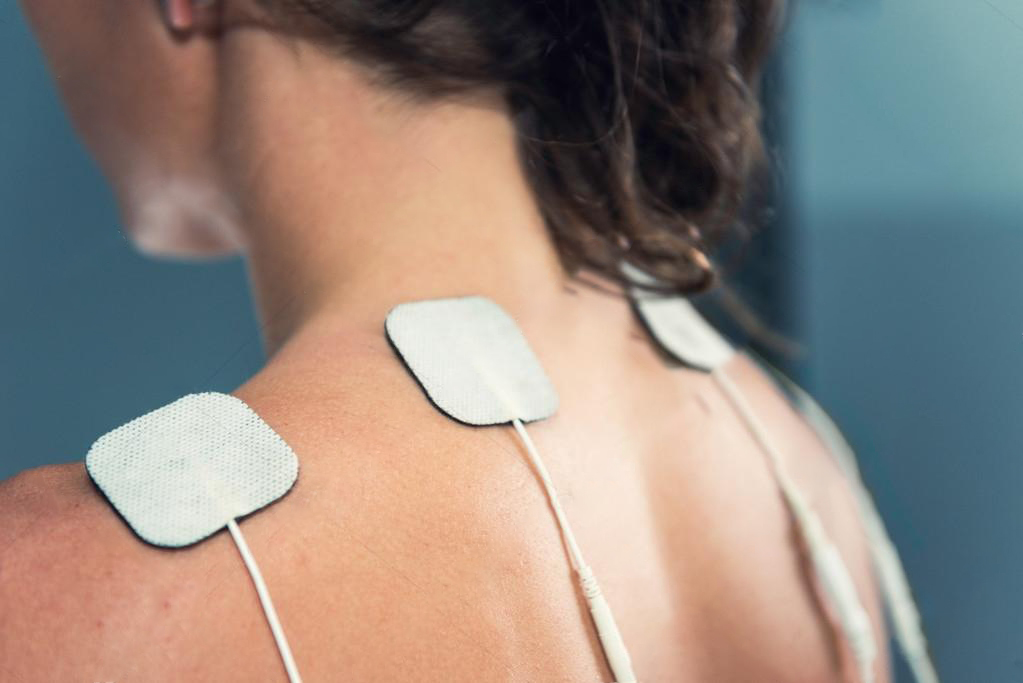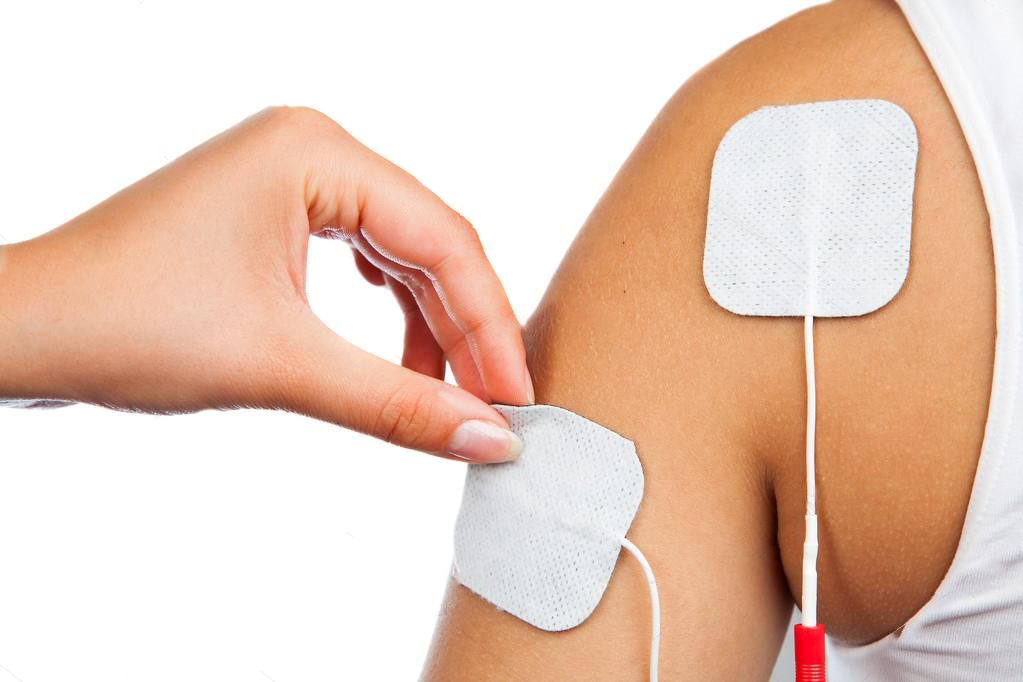Frozen Shoulder

Is A TENS Unit For Shoulder Pain Effective?
Read More
At a glance, shoulder pain affects an estimated 18-26% of the US population. It causes a significant socioeconomic burden and, in severe cases, can lead to 4-16 weeks of sickness absence from work.
But these figures alone don’t offer the full picture of how debilitating and impactful shoulder pain can be on the life and productivity of individuals. So, it isn’t surprising that a growing number of people resort to at-home remedies such as TENS units to ease pain and regain their shoulder mobility. But is TENS all that it promises to be?
While studies have shown the efficiency of medical-grade electrical stimulation to ease pain, at-home TENS treatments might not be as safe or effective as you expect them to be. Let’s look at the best ways to use electroanalgesia to treat shoulder conditions and magnify your quality of life.
Shoulder pain is an umbrella term for any pain, discomfort, and reduced mobility that affects the shoulder area. But with two joints, four tendons, eight muscles, and four ligaments intricately working together, the shoulder’s structure is prone to a range of different conditions.
Most of these, especially the ones arising from inflammation and tissue damage, can be managed using professional electrical stimulation treatments, such as medical-grade TENS units.
Let’s look at the causes of shoulder pain below.

Rotator cuff injuries affect the group of muscles and tendons that keep the shoulder joint mobile. Although these injuries can affect anyone at any time, they are more common among aging adults and people regularly performing overhead movements.
Rotator cuff tears happen due to overuse, trauma, excessive stress, or progressive tear and wear of the tendons and ligaments surrounding the joint. If left untreated, torn rotator cuffs can cause excruciating pain that worsens at night, reduced muscle strength, and hindered mobility.
Bursitis is an inflammatory condition that affects the bursa in the shoulder, a sac-like layer responsible for easing the friction between bones and softer tissue (like tendons or ligaments) during movements.
Bursas can become inflamed due to excessive stress or friction. If you suffer from shoulder bursitis, you might experience several symptoms that range in intensity, including swelling, tenderness, pain, and a “pinching” feeling when performing overhead movements.
Bursitis can be infectious, acute, or chronic, and is more likely in high-risk individuals who have conditions like arthritis, diabetes, or thyroid disease.
If you’ve noticed a sensation of stiffness in the shoulder that is getting worse, you might be dealing with adhesive capsulitis – more commonly known as “frozen shoulder”.
Adhesive capsulitis occurs when the connective tissue around the shoulder joint becomes tight, thick, or stiff, which happens when keeping the shoulder still for long periods, such as after surgery or fractures. Although symptoms can vary in intensity through the freezing, frozen, and thawing phases, adhesive capsulitis can last for up to 2-3 years.
Clinically known as cervical radiculopathy, pinched nerves in the shoulder area occur when a nearby structure, such as bones, traps or presses on a nerve that connects the shoulder joint to the neck or upper spine.
A pinched nerve can trigger a cascade of symptoms, including pain (which usually worsens when rotating the shoulder), reduced mobility, numbness of the hand and fingers, and “pins and needles” sensations.
Shoulder impingement occurs when a small portion of the rotator cuff, which is a band of muscle and soft tissue, gets pinched or catches on the nearby bone structure of the outer edge of the shoulder.
The pinched area can become inflamed and irritated, causing pain on the outer or top side of the shoulder, nighttime aching, and weakness in your arm. Although shoulder impingement accounts for 7-34% of visits to primary care clinics for shoulder pain, it’s most common among athletes who often perform overhead rotational motions.

Since patient-wearable TENS units were introduced in the 1970s, transcutaneous electrical nerve stimulation has proven itself to be an efficient alternative to ease pain without non-steroidal anti-inflammatories (NSAIDs), prescription medications, or surgery.
Transcutaneous electrical nerve stimulation (TENS) is a type of non-invasive analgesic (pain-relieving) treatment that uses mild impulses of electrical current delivered using adhesive pads. Pulses of electricity through the TENS device “floods” the body’s nervous system, thus temporarily reducing the nerves’ ability to transmit pain signals to the brain.
FDA-approved, medical-grade TENS are considered to be an effective electroanalgesic treatment – a method of pain management that leverages weak electrical current. 2015 studies have shown that high-frequency TENS can increase the concentration of endorphins and other pain-relieving hormones, which can have an analgesic effect.
Today, at-home TENS units are easily available over the counter, often at affordable prices. But while they are certainly a tempting alternative to other therapies, patients need to be aware of the risks and downsides of at-home TENS.
These risks, which include interactions with other medical devices and allergic reactions, are even more likely when treating shoulder pain. This is because of the shoulder TENS placement, which is closer to areas such as the neck, head, lungs, and heart.
Not all TENS devices available on the market today are (or need to be) approved by the FDA, because they are not considered to be “of significant risk” to a patient’s health. What’s more, at-home TENS treatments can be performed by anyone, so are therefore not covered by medical insurance.
Conversely, TENS treatments delivered by trained professionals using medical-grade devices are covered by insurance if the treatment is deemed “medically necessary”. In 2012, the CMS also provided patients enrolled in TENS-related clinical trials with Medicare coverage.
If you have been struggling with debilitating pain or are dealing with the aftermath of a shoulder injury, you might wish to try electrotherapy, which offers benefits such as:
In particular, you might use electrical stimulation for rotator cuff tears to support the regeneration of tissue, ease inflammatory diseases such as bursitis and osteoarthritis, and subside neck and back pain while your body heals from an injury. Shoulder electrical stimulation can also be used as a postoperative analgesic treatment.

As a form of electroanalgesia, TENS has been seen to be an effective, non-surgical, and non-invasive pain management method for shoulder pain and joint conditions. Unlike NSAIDs, opioids, and other prescription medications, electrical stimulation does not come with side effects such as dizziness, indigestion, drowsiness, or physical dependence.
But while this might be the right approach to support your shoulder’s healing process, not all TENS devices or treatments are created equal. In particular, at-home units are tuned down to be safer, and they come with significant limitations in terms of electrical power, impulse frequency, and wavelength, meaning they are not classifiable as true electroanalgesic treatments!
At-home TENS machines for shoulder pain are generally considered safe, with limited side effects that include:
However, as seen above, simply buying an at-home TENS unit for shoulder pain won’t necessarily give you access to the broad range of benefits that electroanalgesia can offer. This means that you might be exposing yourself to the potential side effects of TENS without benefiting from the treatment!
At-home tens units emit mild electrical impulses that are, in most cases, not dangerous or painful. But you’ll still need to learn the correct TENS placement for shoulder pain.
Generally, the electrodes are placed on the bulk of the shoulder muscle and to the edge of the shoulder to avoid the bone. However, the TENS unit placement for shoulder pain varies depending on the type of condition being treated. For example, if you are looking to use a TENS unit for rotator cuff pain or injuries, one of the adhesive pads is placed on the front side of the shoulder, while the other one at the back.
In any case, you should always start your treatment journey by consulting a professional and getting adequate training.
The settings of at-home TENS units will prevent you from accidentally delivering power at high frequencies or wavelengths. But, even then, some people should avoid using TENS devices without the supervision of an experienced professional.
In particular, TENS should be avoided in the following cases:

As we have seen above, weak at-home TENS units aren’t just inefficient, but they can also be harmful if used incorrectly.
Instead, to treat shoulder pain, you’ll want to rely on more powerful medical-grade and FDA-approved TENS machines, which deliver more precise high-frequency wavelengths to the affected area. But these units can only be used safely by highly-trained medical professionals, such as the team of specialists at Relatyv.
At our clinics, we aim to treat shoulder conditions and relieve pain by leveraging powerful electroanalgesic treatments, which include (but are not limited to) medical-grade TENS. The stronger wavelength of our equipment, coupled with the skills of our doctors who administer the treatment, can offer longer-lasting results and treat shoulder pain without medications or surgery.
Professionally-delivered electroanalgesia is only one of the facets of a comprehensive and personalized non-invasive treatment for shoulder pain. At Relatyv, we specialize in combining medical-grade TENS, electrical stimulation, lifestyle counseling, and IV therapy to treat discomfort and pain, boost mobility, and magnify the life of our patients.